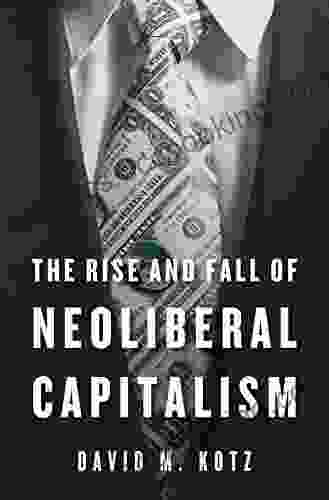The Rise and Fall of Neoliberal Capitalism: A Comprehensive Analysis

4.4 out of 5
| Language | : | English |
| File size | : | 9379 KB |
| Text-to-Speech | : | Enabled |
| Enhanced typesetting | : | Enabled |
| Word Wise | : | Enabled |
| Print length | : | 288 pages |
| Screen Reader | : | Supported |
Neoliberal capitalism has become the dominant economic system of our time, shaping the way we live, work, and interact with the world. From the halls of government to the boardrooms of corporations, its influence can be seen in every corner of society. But what exactly is neoliberal capitalism, and how did it come to power? And, perhaps more importantly, is its reign coming to an end?
The Rise of Neoliberal Capitalism
The roots of neoliberal capitalism can be traced back to the economic turmoil of the 1970s. The oil crisis, combined with rising inflation and unemployment, led to a widespread crisis of confidence in the Keynesian economic model that had dominated the post-war era.
In the wake of this crisis, a new generation of economists and policymakers emerged, arguing that the free market was the best way to promote economic growth and prosperity. They advocated for deregulation, privatization, and a reduction in the role of government in the economy.
These ideas were championed by political leaders such as Margaret Thatcher in the United Kingdom and Ronald Reagan in the United States, who implemented policies that enshrined neoliberal principles into law.
The Key Ideas of Neoliberal Capitalism
Neoliberal capitalism is based on several key ideas, including:
- The free market is the most efficient way to allocate resources. Neoliberals believe that the market should be allowed to operate without government interference, as it will naturally lead to the most efficient allocation of resources and the highest levels of economic growth.
- Deregulation is necessary to promote economic growth. Neoliberals argue that government regulations stifle economic growth by preventing businesses from operating freely. They believe that deregulation will lead to more innovation, investment, and job creation.
- Privatization is necessary to improve efficiency. Neoliberals believe that the private sector is more efficient than the public sector, and that privatizing government-owned enterprises will lead to better services and lower costs.
- The role of government should be limited to providing a stable monetary framework and enforcing contracts. Neoliberals believe that government should play a minimal role in the economy, and that its main responsibility is to provide a stable monetary framework and enforce contracts.
The Consequences of Neoliberal Capitalism
Neoliberal capitalism has had a profound impact on the global economy and society. On the one hand, it has led to increased economic growth and prosperity for many people. On the other hand, it has also led to increased inequality, social unrest, and environmental degradation.
One of the most significant consequences of neoliberal capitalism has been the rise of economic inequality. Since the 1980s, the gap between the rich and the poor has widened in many countries, as the wealthy have benefited disproportionately from the gains of globalization and technological change.
Neoliberal capitalism has also led to increased social unrest. The policies of deregulation, privatization, and austerity have led to job losses, wage cuts, and reduced access to essential services for many people. This has led to growing resentment and anger towards the wealthy and the political establishment.
Finally, neoliberal capitalism has also had a negative impact on the environment. The emphasis on economic growth and profit maximization has led to increased pollution, deforestation, and climate change.
The Fall of Neoliberal Capitalism?
In recent years, there has been a growing sense that neoliberal capitalism is in decline. The global financial crisis of 2008, the rise of populism and nationalism, and the growing awareness of the environmental crisis have all led to a questioning of the neoliberal orthodoxy.
There is no doubt that neoliberal capitalism has been a transformative force in the global economy and society. But its future is far from certain. The consequences of neoliberal capitalism have been both positive and negative, and it is now up to us to decide what kind of economic system we want for the future.
The rise and fall of neoliberal capitalism is a complex and fascinating story. It is a story that has shaped the world we live in today, and it is a story that will continue to be told for generations to come.
4.4 out of 5
| Language | : | English |
| File size | : | 9379 KB |
| Text-to-Speech | : | Enabled |
| Enhanced typesetting | : | Enabled |
| Word Wise | : | Enabled |
| Print length | : | 288 pages |
| Screen Reader | : | Supported |
Do you want to contribute by writing guest posts on this blog?
Please contact us and send us a resume of previous articles that you have written.
 Book
Book Novel
Novel Page
Page Chapter
Chapter Text
Text Story
Story Genre
Genre Reader
Reader Library
Library Paperback
Paperback E-book
E-book Magazine
Magazine Newspaper
Newspaper Paragraph
Paragraph Sentence
Sentence Bookmark
Bookmark Shelf
Shelf Glossary
Glossary Bibliography
Bibliography Foreword
Foreword Preface
Preface Synopsis
Synopsis Annotation
Annotation Footnote
Footnote Manuscript
Manuscript Scroll
Scroll Codex
Codex Tome
Tome Bestseller
Bestseller Classics
Classics Library card
Library card Narrative
Narrative Biography
Biography Autobiography
Autobiography Memoir
Memoir Reference
Reference Encyclopedia
Encyclopedia David Kadavy
David Kadavy David M Wight
David M Wight David Leroux
David Leroux David M Oshinsky
David M Oshinsky David E Hoffman
David E Hoffman David W Allen
David W Allen David Hewson
David Hewson David Bramwell
David Bramwell David Tuffley
David Tuffley Danielle Geller
Danielle Geller David W Galenson
David W Galenson David Drake
David Drake Dave Bio Baranek
Dave Bio Baranek Debbie Jorde
Debbie Jorde David Rabe
David Rabe Daniel Ritchie
Daniel Ritchie Daryl Riersgard
Daryl Riersgard David J Griffiths
David J Griffiths Darwin V Ellis
Darwin V Ellis David L Vance
David L Vance
Light bulbAdvertise smarter! Our strategic ad space ensures maximum exposure. Reserve your spot today!

 Shane BlairDiscover the Enchanting World of The Treekeepers: A Literary Journey into the...
Shane BlairDiscover the Enchanting World of The Treekeepers: A Literary Journey into the...
 Cormac McCarthyEaster Counting for Toddlers: A Delightful Journey of Discovery and Learning
Cormac McCarthyEaster Counting for Toddlers: A Delightful Journey of Discovery and Learning Steven HayesFollow ·13.2k
Steven HayesFollow ·13.2k Griffin MitchellFollow ·10.6k
Griffin MitchellFollow ·10.6k Herman MelvilleFollow ·19.6k
Herman MelvilleFollow ·19.6k Zachary CoxFollow ·15.9k
Zachary CoxFollow ·15.9k Bruce SnyderFollow ·4.2k
Bruce SnyderFollow ·4.2k Pat MitchellFollow ·12.6k
Pat MitchellFollow ·12.6k Vic ParkerFollow ·5.7k
Vic ParkerFollow ·5.7k Austin FordFollow ·8.1k
Austin FordFollow ·8.1k

 Cameron Reed
Cameron ReedHow to Know When Language Deceives You
Unmasking the Power of...

 Robbie Carter
Robbie Carter50 Things To Know About Planning Home Schooling...
: The Power of Hands-On Learning Embarking...

 Julio Cortázar
Julio CortázarCalculus: Single and Multivariable, 8th Edition — The...
Calculus is the...

 Jaime Mitchell
Jaime MitchellBunnicula and Friends: A Spooktacular Tale of Mystery and...
In the quaint little town of Celeryville,...

 Josh Carter
Josh CarterPeppa Easter Egg Hunt: Join Peppa Pig on an...
Get ready for...

 Donovan Carter
Donovan CarterBoy Called Dickens: A Journey into the Childhood of a...
Delving into the...
4.4 out of 5
| Language | : | English |
| File size | : | 9379 KB |
| Text-to-Speech | : | Enabled |
| Enhanced typesetting | : | Enabled |
| Word Wise | : | Enabled |
| Print length | : | 288 pages |
| Screen Reader | : | Supported |








